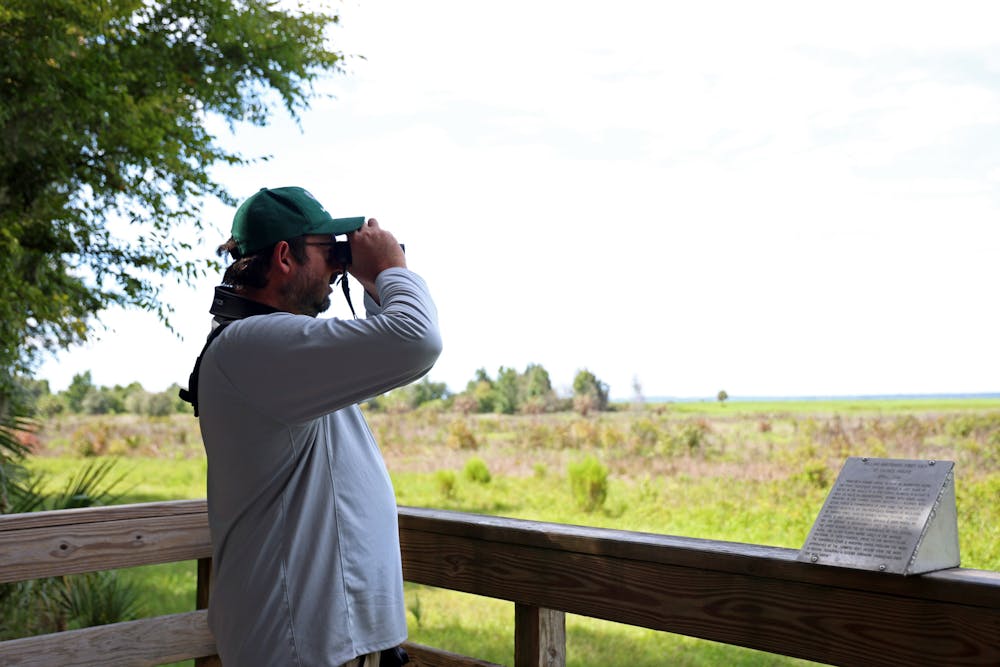North Central Florida could house the country’s 64th national park, and Florida’s fourth.
U.S. Rep. Randy Fine, R-F.L., proposed a bill July 23 that would create a new national park in Florida. It includes all of the Ocala National Forest and Paynes Prairie.
The bill, titled “The Path to Florida Springs National Park Act,” includes 2,800 square miles in Central and North Florida — much of which is already protected by the state or federal government. The area will also cover several springs, including Alexander and Silver Springs.
Congress has not yet passed the bill, but if it does, making the parks a reality would take time. The secretary of the interior must first conduct a study determining the suitability of designating the land under the National Park System, which he would then present to Congress within three years. If Congress approves the study, the areas would gain national park status.
Supporters say the bill could have positive effects in the state by preserving the springs from which a majority of Floridians get their drinking water. But opponents, some of whom have already put out petitions decrying the legislation, caution against giving the federal government more power over state parks and question whether the change will actually protect the environment.
Support for the proposal
Ellen Siegel, a climate speaker specialist at the Climate Leadership Engagement Opportunities Institute, said the proposal protects vulnerable resources. Siegel’s support for the proposal comes from nearly 30 years of experience with the National Park Service, she said.
The mission of the National Park Service is to protect places and preserve them for current enjoyment and future generations, she added.
She also mentioned a statewide benefit of the proposal: sustaining the water supply.
“We could run out of water, as unbelievable as that seems,” Siegel said. “Having a national park protection for withdrawals and stewardship would be a good idea.”
The agricultural industry is putting “tremendous” pressures on the springs in North Central Florida by continuing to draw water from them, she said. National park status would keep those pressures at bay, she added.
As North Florida continues to develop, water extraction from the aquifer is a recurring problem, Siegel said. Recharging the aquifer, or letting it refill with water, takes time, she added.
Jonathan Rubin, the president and executive director of the Clean Earth Initiative, agreed.
About 90% of Floridians get their drinking water from the spring area, according to The Nature Conservancy.
“If there’s an issue with overdevelopment or pollution in one part of Florida, the rest of Florida quickly feels it,” he said.
Rubin said this proposal will put the different national parks, preserves and forests in North Central Florida under one shared umbrella to protect the region from water overdraws. He also said a national park would create more economic opportunities for local communities.
Creating the national park could also bring in tourists, Rubin said, which would generate money to develop local economies and make sure the springs don’t get further contaminated.
There are 30 “first-magnitude” springs in central and northern Florida — those that discharge at least 65 million gallons of water every day. All but four are polluted because of runoff from fertilizers, pesticides and paved roads preventing water from filtering into aquifers, according to the Associated Press.
The national park status would also prohibit hunting, which Rubin said could benefit hunters and fishers. By creating a safety zone for wildlife, the bill would create healthy populations that go into other areas where they can then be hunted, he said.
Concerns and questions answered
While Rubin said the bill has the potential to “do a lot of good,” some feel differently.
On Aug. 26, a Marion County resident started a petition named “Protect the Ocala National Forest.” Over 7,700 people signed the petition in support of her concerns, including one about undermining preservation for short-term economic interests.
Ryan Smart, executive director of the Florida Springs Council, said he doesn’t think Fine is proposing a national park for “nefarious” reasons. But he still doesn’t support the plan, saying there are better ways to protect the springs and nearby forests.
Rather than a national park, Smart said, he’d like to see the local government control development and reduce water and fertilizer use. The purpose of the proposal is to protect the springs, but the bill does little to protect them, Smart said.
The two major problems Florida springs face are too much nitrogen pollution and overdrawing water from the ground for agriculture and development — both of which are not addressed in the proposal, he said.
“If there’s going to be a big proposal to protect and restore springs, we would like it to actually have some benefit in protecting and restoring our springs,” he said.
The springs council put out a statement Sept. 4 in opposition to the proposal. In it, the group expressed concerns over a lack of benefits to Florida springs and state parks, loss of state control over public lands and jeopardizing recreational activities, like off-roading, hiking and primitive camping, that visitors have enjoyed at Ocala National Forest for decades.
“We need the outdoor community to be unified about protecting the things we love,” Smart said.
A national forest aims to preserve resources while also allowing for activities like logging, grazing, mining and recreational activities like hunting and fishing. A national park aims to preserve natural and cultural resources, focusing on protection and limited activity. The Ocala National Forest received its designation Nov. 24, 1908, and has since remained a national forest.
Turning Ocala National Forest from a forest into a park would move the land to different departments within the federal government, explained Taylor Stein, a 55-year-old UF ecotourism and natural resources professor. The different land designations are important, he said, and he’s never seen land move from one department to another in his lifetime.
Although national parks are more protected than forests, he said, the protection is not always good. If the park is protected against logging, a technique that makes timber from trees, one tree species could overtake another, threatening the area’s ecosystem.
“That would be massive if that actually was actually true,” he said. “And that’s why I kind of don’t believe it’s going to be true.”
Regardless, Stein said he hopes if the bill is approved, more people will talk about the Gainesville springs.
While the proposal is changing government land from one name to another, the prestige could get more people and schools talking about the environment, Stein said.
“That’s my job, is to get people to love the Florida environment,” he said. “The more we can get people to love and understand Florida ecosystems and Florida environment, I would be happy,” he said.
Contact Sofia Bravo at sbravo@alligator.org. Follow her on X @sofiab026.

Sofia is a junior journalism student who is the Fall 2025 enterprise health reporter. She previously worked as a copy editor and translator for El Caimán. In her free time, she enjoys reading and bothering her friends with her digital camera.






